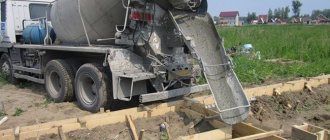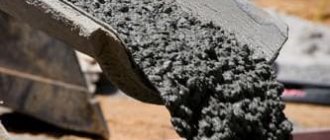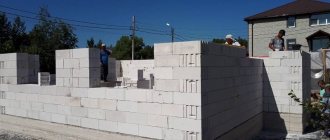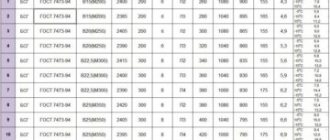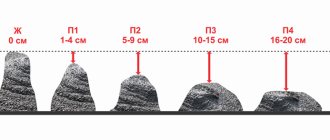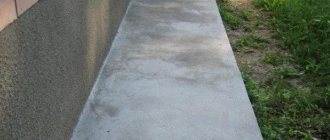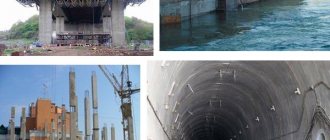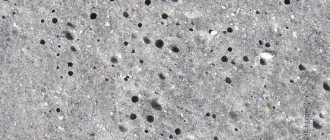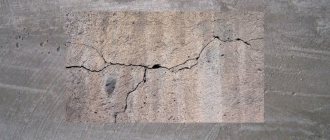Concretes are various types of artificial stone, the basis of which is cement or other binding material. In the production of concrete, a variety of fillers are used: crushed stone, sand, lime and other substances. A variety of additives are used to achieve certain properties of products.
There are several types of classification of concrete products. One of them involves dividing concrete according to its intended purpose for performing certain construction works. In this case, concretes are divided into:
- ordinary;
- hydraulic engineering;
- for airfield pavements;
- road, sidewalk;
- concrete for special purposes (acid-resistant, for radiation protection, fire-resistant and others).
Concrete is widely used in construction work , both in Russia and abroad. Despite the importance of the safety and quality of this material for building structures, concrete is not subject to mandatory certification in the Russian GOST R conformity assessment system. This material, like a significant number of other building materials, is not included in PP No. 982 dated December 1, 2009, which defines list of goods required for certification in the GOST R system.
Voluntary certificate
On a voluntary basis, a certificate for concrete can be obtained both in the GOST R system and in other officially registered certification systems of the Russian Federation. Almost all documents for concrete products include indicators for non-standard requirements that are typical for certain types of construction.
In order for the special properties of concrete to be documented in the certificate, they must be indicated in the application for confirmation of conformity, which is drawn up by the applicant when applying to the certification body .
A mandatory attribute of an application for certification of concrete (and other materials) is an indication of the regulatory document for compliance with which the procedure will be carried out. Such documents may include existing state standards for the material, industry standards or officially registered enterprise standards - Technical Specifications.
Acceptance of M400 concrete by quantity
There are two ways to estimate the amount of concrete mixture delivered:
- By volume. The concrete mixture is unloaded into a container whose volume is known. If you need to know the tonnage of the material, then the volume should be multiplied by the density indicated in the passport.
- By weight. The method is used on large construction sites equipped with vehicle scales. The mixer undergoes weight control upon arrival and departure from the site. The difference will be the weight of the concrete mixture.
The quantitative parameters indicated in the documents may differ from the actual ones by up to 5%. This is not at all due to the supplier’s dishonesty, but to natural losses of the mixture during loading, transportation, and unloading.
Certificate in the form of QMS
A certificate of conformity obtained in confirmation of compliance with the requirements of the ISO 9001 series standards for the enterprise quality system (QMS) for concrete production can become convincing confirmation of the high quality of the products of a particular construction plant. The QMS confirms that the production processes and quality control of the enterprise itself meet modern global requirements.
If such a document is available, during any subsequent assessment of the conformity of the concrete mixture, it is recommended to submit it to the certification body of any of the conformity assessment systems. The presence of this document allows you to determine the most optimal scheme for confirming product conformity from the point of view of minimizing costs and for a longer period.
What does the passport for concrete M200 contain?
The form of the document on the quality of concrete mixture B15 (m200) is approved by the Ministry of Construction and is contained in Appendix B of GOST 7473-2010. In accordance with the state standard, a document confirming the quality of concrete of a given strength class contains the following information:
- name and details of the BSU or manufacturer;
- name and details of the buyer (consumer);
- date, time of shipment of concrete mixture M-200;
- type of concrete with symbol;
- data (number) on the nominal composition;
- volume in cubic meters of material in the batch;
- workability grade P1…P4;
- maintainability of workability;
- other standardized characteristics at the installation site;
- maximum aggregate fraction size;
- mark of conformity (if the manufacturer has a certificate);
- strength class B15 at design and intermediate ages;
- density grade D;
- specific activity of natural radionuclides.
The document is signed by an authorized person or the head of the laboratory.
When ordering a concrete mixture m200 of a given composition, a quality document is drawn up in accordance with Appendix B of GOST 7473-2010. The concrete passport in this case contains the information:
- name and details of the BSU or manufacturer;
- name and details of the buyer (consumer);
- date, time of shipment of mixture M-200;
- type of concrete with symbol;
- volume in cubic meters of material in the batch;
- volume of concrete mixture in the load and vehicle number;
- preservation of concrete mortar characteristics;
- data (number) on the nominal composition;
- components of concrete M200 (B15): cement, fine and coarse aggregate, chemical additives, water;
- specified and actual composition of the concrete mixture;
- specific activity of radionuclides.
Sanitary certificate
Such a voluntary document can be obtained in the form of an Expert Opinion from Rospotrebnadzor to confirm compliance with the uniform requirements of the Customs Union upon the first release of a new brand of concrete on the territory of the Customs Union or on the Russian construction market.
This is possible by issuing a sanitary certificate in the form of a voluntary Expert opinion based on test reports of concrete samples carried out in testing certification laboratories (or centers) included in the unified register of the Customs Union.
The average setting time (hardening) of the prepared concrete mixture is about 2 hours. The use of special additives (plasticizers) allows you to increase the hardening time by 2-4 hours. The presence of such technologies makes it possible to import or export concrete products to the border areas of neighboring countries. Such concretes are also subject to sanitary inspection. They must confirm the absence of radiation risks from using these products in building structures.
Concrete quality document M200
Document on the quality of the concrete mixture M 200 (concrete passport) is the main document confirming the compliance of the solution with the declared technical characteristics. The passport is issued on the basis of tests performed on B15 concrete samples in an accredited laboratory. Tests are carried out on the main technical and operational characteristics:
- strength GOST 18105;
- frost resistance GOST 10060;
- workability GOST 10181;
- average density GOST 12730;
- water resistance GOST 12730;
- abrasion on the wheel GOST 13087;
- persistence of the specified parameters according to GOST 30459.
A concrete passport is issued for each batch of material. If material from a batch is supplied to several consumers, then a quality document is issued to each buyer.
Cost of the Concrete certificate in Bryansk
The price of a certificate of conformity Concrete in Bryansk depends on:
- The amount may vary depending on the type or type of product, for example Concrete has different types of processing
- The company is a manufacturer or supplier
- The company is registered in Bryansk
- The cost of a product certificate varies depending on the quantity of goods produced or supplied. Certification for a product is issued both for the type of product and for one batch of goods
- Concrete certification price
- The validity period of the technical regulations of the customs union is 1 and 3 years
What is voluntary certification for concrete?
This procedure can only be carried out after completion of the main procedure prescribed by law. It can be initiated by every entrepreneur in relation to any product. It is carried out within the framework of the national system of standards of the Russian Federation. A voluntary certificate of conformity for concrete, issued based on the results of a successful inspection, opens up new business opportunities:
- acts as a guarantor of quality for consumers and large customers;
- strengthens the position of the product in a responsible market;
- allows participation in public auctions;
- much more.
During the inspection, the applicant can independently choose the standard by which to evaluate the product (GOST, TU or individual indicators).
In addition, our specialists will help in preparing the following voluntary documents for products:
- ISO certificates: this documentation confirms the implementation of various management systems in the production process and contributes to the company’s successful entry into the markets of other countries.
- radiology protocol - a document indicating the radiation safety of a building material;
- expert opinion - confirmation of hygienic, sanitary and epidemiological standards.
Use the services of our company and receive a complete permit package for running a successful and legal business.
Where can I obtain a quality certificate for concrete?
Approval of technical regulations of the EAEU or national GOSTs is possible only in specialized centers with the necessary accreditation. Including . Our own accredited laboratory allows us to carry out all tests quickly and inexpensively.
Advantages of obtaining a concrete certificate from SK Certificate LLC
“SK Certificate” is a certified certification body with its own testing laboratory;
Business-friendly. Certification of your concrete on a turnkey basis in Moscow in 1 working day with entry into the register;
We prepare all types of permits for concrete and reinforced concrete products;
The company's engineers and lawyers will advise and help with the certification of concrete products.
Flexible pricing policy - when ordering accompanying certificates, a discount is provided (concrete and cement)!
Ordering certification from us is a guarantee of results and the success of your business
Certificates issued by our clients
In what cases is a certificate not needed?
A concrete certificate is not required for those manufacturers who do not intend to participate in tenders and export their products. For such products, a passport for the concrete mixture will be sufficient.
In addition, if a supplier does not want to undergo voluntary certification for concrete, but wants to close all questions about the legality of production and supply of concrete, then he can contact an accredited certification center for an information (waiver) letter. This document confirms that the concrete mixture does not fall under any technical regulations of the EAEU and is not included in the list of products of RF PP No. 982.
Stages of obtaining a concrete certificate
Certification of concrete, regardless of its type, takes place in several stages:
- The applicant applies to an accredited certification center, submits an application for confirmation of conformity, copies of his registration documents and product documents.
- Center employees check the provided documents, after which they approve the decision to carry out certification work and develop a scheme for compliance with the stated standards.
- Selection of concrete mixture samples for research in the testing laboratory of the center.
- Direct examination of the product, confirmation of its characteristics declared by the manufacturer. The test result is recorded in the test report.
- Making a decision by an accredited certification center to issue a certificate of conformity or refuse.
After successfully completing the certification stages and making a positive decision, the certification company issues the applicant a concrete quality certificate and submits the data to Rosreestr.
Answers on questions
Is it possible to undergo concrete certification remotely?
Yes, it is not difficult to order a permit from the Insurance Company Certificate without personal presence. Clients are consulted in any convenient way, and documents and product samples for testing are delivered by courier service.
What type is sand concrete and how to get a certificate for it?
Sand concrete belongs to fine-grained concrete; GOST 26633-2012 is used to compare its characteristics with standard ones. Products are not subject to mandatory certification; there are currently no EAEU technical regulations for concrete. Voluntary certification is carried out by an accredited certification body at the request of the manufacturer.
What grade of concrete is used for the construction of country houses?
Concrete grades M250 and M300 are best suited for the foundations of large private residential buildings. Brand M300 is used for pouring the foundations of cottages with a height of up to 5 floors. Concrete grade M300 is the first in strength, which is recommended for use for monolithic floors.
What is “cold” concrete and what standards must it meet?
“Cold” concrete is concrete made with an antifreeze additive that constantly hardens at subzero temperatures. Additives for concrete and mortars are regulated by GOST 24211-2008 and GOST 30459-2008; the certificate can indicate compliance with this criterion.
Declaration for concrete mixtures: is it possible to choose instead of voluntary certification?
In contrast to the declaration of conformity, the legislation of the Russian Federation assumes both mandatory and voluntary nature of certification. The declaration must be completed for various products in accordance with one or another technical regulation or standard. Construction mixtures classified by OKPD2 codes 23.63.10.110 and 23.64.10.110 are subject to mandatory declaration of conformity. At the same time, a voluntary certificate does not replace the requirement to confirm compliance by declaring,
Re-issuance of a certificate
To reissue a certificate, the applicant must contact the certifying authority. Replacing a certificate without testing is possible if an error or typo was discovered in the certificate, or there was a change in the manufacturer or product data (if the change did not affect the technical characteristics of the concrete mixture).
If there is a change in the composition of concrete, its type, or characteristics, then the previously issued certificate will no longer be valid for the product. For any new product, certification is only possible through testing and research in a laboratory.


